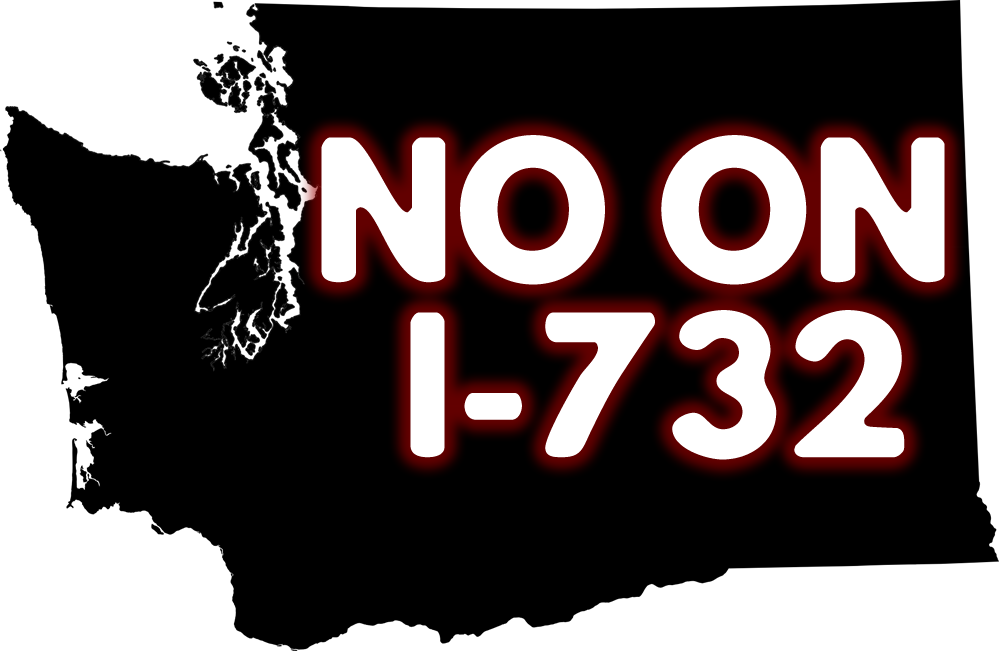Although this week marks the signature submission deadline for 2016 initiatives to the people, it’s worth remembering that there are two initiatives to the 2016 Legislature that were previously certified to the ballot at the beginning of this year. Neither was acted on by the House and Senate, so the people will decide their fate in November. The first initiative voters will see on their ballot is CarbonWA’s I‑732, and we tested its ballot title last month in our end-of-spring poll.
Here’s what we found:
There will be a measure on Washington’s November 2016 ballot called Initiative 732, concerning taxes. The description reads as follows: This measure would impose a carbon emission tax on certain fossil fuels and fossil-fuel-generated electricity, reduce the sales tax by one percentage point and increase a low-income exemption, and reduce certain manufacturing taxes. If the election were being held now, would you definitely vote yes, probably vote yes, probably vote no, or definitely vote no on Initiative 732?
- Yes: 52%
- Definitely vote yes: 21%
- Probably vote yes: 31%
- No: 39%
- Probably vote no: 21%
- Definitely vote no: 18%
- Not sure: 8%
This survey of 679 likely Washington State voters was in the field from June 14th-15th, 2016; all respondents participated via landline. The poll has a margin of error of +/- 3.8% at the 95% confidence level.
These are the best numbers we’ve seen for the I‑732 ballot title, but still not very robust considering that progressives are not unified behind I‑732 and considering that is likely going to need to withstand a NO campaign with some money behind it. There’s simply no cushion, no margin for error in these numbers.
Notice that the percentage of respondents definitely planning to vote for I‑732 is only 21%. Contrast that with the 56% of respondents who are definitely supportive of I‑1491 (extreme risk protection orders).
The Alliance for Jobs & Clean Energy, which NPI is a member of, previously tested the I‑732 ballot title and found that it started out at 39% in favor.
Average our survey’s findings with theirs, and you get 45.5% Yes. That’s simply not where a Yes campaign wants to be heading into an election.
NPI has taken a position opposing I‑732, as has the Washington State Labor Council, the Washington State Democratic Party, OneAmerica, Fuse, and many other progressive organizations based here in the Pacific Northwest. The recently finished con voter’s pamphlet statement nicely summarizes our objections:
State Deficit
I‑732 will make Washington’s budget mess worse. A Department of Revenue analysis found I‑732 will cut funding available for education, health care, and other vital services by $797 million over the next six years. Our state faces a $5 billion deficit and court orders to meet basic education and mental health needs. I‑732 makes this situation worse.
Climate and Jobs
Climate policy must be comprehensive, so it doesn’t harm people and kill jobs. I‑732 fails this test. A clean-energy economy can reduce carbon emissions and reverse climate change while also creating family-wage jobs, rebuilding crumbling infrastructure, investing in areas hardest hit by pollution, and providing a “Just Transition” for workers and communities. I‑732 doesn’t do any of this. Instead, I‑732 imposes an accelerating carbon tax on businesses, with no provisions for compliance flexibility or energy-efficiency incentives. Some businesses will simply move their jobs and pollution across state lines.
Equity
Vulnerable families in communities near pollution hot spots and workers in energy intensive industries are hardest hit by pollution. But I‑732’s “Working Families Tax Exemption” provides less than half of this population with any relief from increased energy costs. These communities will need investments and jobs to make an equitable transition to a forward-thinking clean-energy economy. I‑732 ignores this. At a time when we are struggling to maintain good jobs and fund basic services, I‑732 would send Washington in the wrong direction.
Vote NO.
Back when there was still time to put a campaign together, NPI urged the Alliance for Jobs & Clean Energy to stick to its pledge to qualify its own plan to the November ballot to compete with I‑732. Sadly, that didn’t happen.
We believe the best course of action now is to reject I‑732 in November and work to pass a comprehensive plan to stop pollution and address damage to the climate in the 2017 Legislature — if we get a Democratic Legislature. Otherwise, we’ll need to put together a new initiative campaign — hopefully one that excites progressives and gets near unanimous or unanimous support from the environmental movement.

